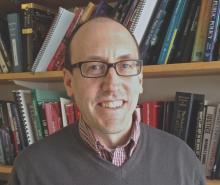People being charged and imprisoned for crimes they did not commit continues to be an issue in Canada and beyond, and International Wrongful Conviction Day serves as an important reminder, says a University of Guelph professor.
“I think there is a tendency for people to forget about the problem until the next high-profile case of wrongful conviction arises,” said political science professor Troy Riddell, who studies criminal justice policy, judicial politics, and rights and liberties and teaches in U of G’s Criminology and Criminal Justice Policy graduate program.
“The day is also a symbolic reminder that we will not forget about those who have been wrongfully convicted.”
 Wrongful Conviction Day, held on Oct. 2, was created in 2014 by the Association in Defence of the Wrongfully Convicted, now called Innocence Canada.
Wrongful Conviction Day, held on Oct. 2, was created in 2014 by the Association in Defence of the Wrongfully Convicted, now called Innocence Canada.
The group will recognize the day with a reception Thursday, Oct. 6 in Toronto with keynote speaker Maria Shepherd, whose conviction for manslaughter 25 years ago was overturned earlier this year. Eight major landmarks across Canada were lit up to mark International Wrongful Conviction Day, including the CN Tower, City Hall in Vancouver and McMahon Stadium in Calgary.
U of G has been involved in numerous awareness efforts tied to wrongful convictions, most notably the Truscott Initiative. Launched in 2009, this justice studies project commemorates the struggles of Guelph resident Steven Truscott and his family.
Wrongfully convicted at age 14 after the 1959 murder of schoolmate Lynne Harper, Truscott was released from prison in 1969. He was acquitted by the Ontario Court of Appeal in 2007.
At Guelph, the initiative funds the annual Truscott Lecture in Justice and the Truscott Family Scholarship in Justice Studies, an entrance scholarship for students engaged in community volunteer activities.
Truscott lecturers have included former Ontario Court of Appeal judge Stephen Goudge and James Lockyer, the criminal lawyer who defended Truscott during his original trial. The University awarded Lockyer an honorary degree in 2007.

“The lecture is valuable in bringing together students and members of the community, including some who are involved in criminal justice,” Riddell said. “The Truscott family attends this event as well, which makes it particularly special.”
U of G offers undergraduate and graduate courses in criminology and criminal justice policy, including a fourth-year special topics course on Wrongful Convictions taught by Prof. Carolyn Yule, Department of Sociology and Anthropology. She works with Innocence Canada to arrange guest speakers for the course.
Innocence Canada was founded in 1993 and has helped exonerate 21 wrongfully convicted people, including Truscott. The organization works with volunteer lawyers on a pro bono basis.